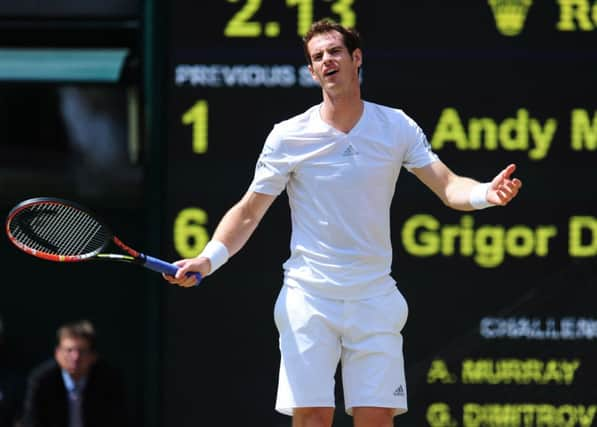Wimbledon: Ludicrous to write off Andy Murray


Similarly, now that Murray has failed to retain his Wimbledon crown, some will be ready to write him off. They are wrong too.
Leaving aside for the moment the demoralising nature of his defeat by Grigor Dimitrov yesterday, the fact is that sooner or later his remarkable consistency at Wimbledon had to end. From 2005, when he reached the third round on his debut, up until last year, he had a proud record of always having at least equalled his previous best every time he was in the tournament.
Advertisement
Hide AdAdvertisement
Hide AdHis ascent to the pinnacle of tennis was conducted in stages, as if, like a mountaineer, he had to acclimatise himself before moving on. In 2007 he was unable to take part because of injury, but otherwise his rise was irresistible. Quarter-finalist, semi-finalist, losing finalist, winner.
Beating Kevin Anderson in the fourth round here took him through to the last eight for the seventh consecutive year. It also extended his run of consecutive Grand Slam quarter-finals to 14.
At 27, he is at his peak, and could have five or six more years at the top level. The stereotypical bad day at the office does not change that.
Indeed, one thing that made that bad day so frustrating was the form Murray had shown in the previous four rounds. He got through them without so much as the loss of a set, dropped fewer games than ever before – 32 – en route to the last eight of a slam, and extended his winning streak at the All England Club to 17 matches, stretching back to the Olympic Tennis Event of 2012.
None of that makes him sound like a man who is on the wane. True, the draw he received here was favourable, but he still had to beat two other seeds – Anderson and Roberto Bautista Agut – to get as far as he did. And, remembering that he had back surgery last autumn, he can look back on this Wimbledon – again, yesterday excepted – as a decent defence of his title.
But needless to say, neither the decent form he showed in his previous matches nor his general prowess over the past few years was much consolation to Murray yesterday. While labelling the Dimitrov defeat as a bad day, he admitted he would have to spend some time working out what went wrong, and how to avoid a repetition.
As he did six years ago when he lost comprehensively to Rafael Nadal here, he said he would go away and work even harder. At a time when players three or four years younger than the 27-year-old are making their breakthrough, he has decided he has not improved enough over the past year. At the top of the rankings you have to run in order to stand still, and Murray reckons he has not been running fast enough.
Besides working harder – and there is surely a limit to the amount of extra self-punishment he can take – the Scot may also have to look again at his mental approach. He is there to be shot at now by the young guns like Dimitrov, Nick Kyrgios and Milos Raonic, and there may be a tendency for a defensive mentality to predominate.
Advertisement
Hide AdAdvertisement
Hide AdHis former coach Ivan Lendl identified the need to be more aggressive as one of the vital changes Murray had to make to go from contender to champion, and it worked. Lendl was not alone in examining his player’s game and coming to the current conclusion about how to improve it, but the crucial thing was that Murray respected his opinion and listened to it. Now Lendl has gone, we will never know if he could have gone on to take Murray to an even higher level.
Instead, the British No 1 now has to go through a similar process with his new coach, Amelie Mauresmo. He enjoys her company, he respects her, but so far they have not been together long enough to allow the Frenchwoman to construct a full programme.
While Murray puts in solid training over the coming weeks, Mauresmo must complete a thorough analysis of his game and that of his opponents. It will be tough to kick on from here, but it can be done. To presume otherwise would be ludicrously premature.